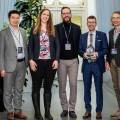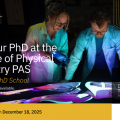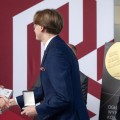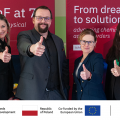BERSTIC summit at IChF: building a sustainable and inclusive future based on engineering business opportunities for the Hydrogen Industry
Reading time: about 11 minuts
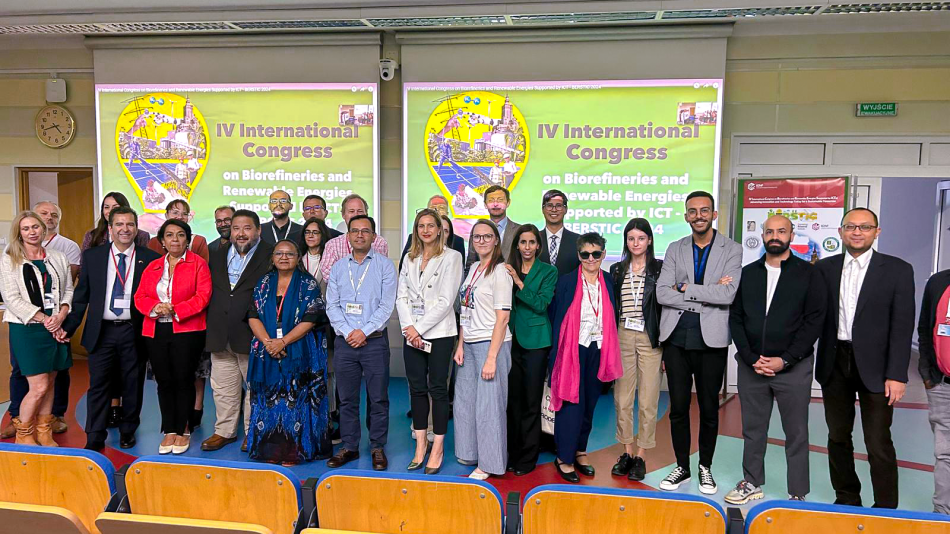
The IV International Congress on Biorefineries and Renewable Energies, supported by ICT – BERSTIC 2024, was successfully held on Friday, September 20th, 2024, marking a significant achievement in advancing sustainable development. This inspiring congress, which took place at the Institute of Physical Chemistry, Polish Academy of Sciences (IChF) in Warsaw, brought together experts from diverse disciplines to explore innovative solutions for global sustainability challenges. The journey began with a face-to-face meeting in Manaure, La Guajira, Colombia, in May, continued through virtual sessions in August, and culminated with a dynamic closing keynote and Elevator Pitch in Warsaw.
The Wayuu are the largest indigenous group in Colombia, residing primarily in the La Guajira Peninsula. Despite their rich cultural heritage, the Wayuu face severe social, economic, and environmental challenges, including poverty, lack of infrastructure, and a harsh climate in the La Guajira region. With these issues in mind, the BERSTIC network has been evolving to contribute to addressing these challenges, particularly in the renewable energy sector.
The congress was officially inaugurated by Prof. Adam Kubas, Director of IChF, who underscored the institute's mission to address real-world problems. His address was followed by remarks from Juan Sebastián Bayona, the First Secretary of Foreign Relations of the Colombian Embassy in Poland, who emphasized the critical role of such events in fostering innovation and underscoring our collective responsibility for sustainability.



Photos: the speeches of Prof. Adam Kubas, Director of IChF inaugurating the congress, and the First Secretary if the Colombian Embassy A.I, Juan Sebastián Bayona.
The congress consisted of three parts. The first part featured thought-inspiring presentations from three distinguished keynote speakers. Prof. Dr. Fernando Colmenares delivered a compelling talk titled “Towards a Sustainable and Inclusive Colombia: Closing Knowledge and Needs Gaps via Diplomacy for Science, Technology, Innovation and Culture.” Prof. Dr. Alberto Coz shared insights on “Communicating Science to All Audiences: A Case Study of the CELISE Project,” while Dr. Olga Rostkowska addressed the importance of “Education for the Wellness of People & Planet: Integrating Lifestyle Medicine into Environmental Stewardship.” Marina Martinez-Garcia from SOST-CDTI concluded this segment with a presentation on “International Cooperation under the Horizon Europe Calls.”
Photos: The speech of Prof. Dr. Fernando Colmenares related “Towards a Sustainable and Inclusive Colombia: Closing Knowledge and Needs Gaps via Diplomacy for Science, Technology, Innovation and Culture.”


Prof. Dr. Alberto Coz from the university of Cantabria presented “Communicating Science to All Audiences: A Case Study of the CELISE Project.”

Photos: Dr. Olga Rostkowska from Medical University of Warsaw addressed “Education for the Wellness of People & Planet: Integrating Lifestyle Medicine into Environmental Stewardship.”


Elevator pitch from the IV International Congress on Biorefineries and Renewable Energies Supported by ICT - BERSTIC 2024
The second part of the evet were the 11 elevator pitches presented by engineers and researchers. Harry Martinez introduced TempoAI, an app that uses AI to optimize time and resources. Alejandro Vargas Cuartas showcased the Power System Analyser, which enhances the economic viability of energy systems. Jose Lopez presented a platform for international research networking. Prof. Dr. Fernando Colmenares discussed ESIM, a system focused on renewable energy in vulnerable Colombian communities. CEO Marcin Holubiec shared insights on tailored energy solutions. Postdoc Ahmed Malek Djaballah highlighted methods to convert waste into hydrogen, while CEO Isabel Rodríguez presented an initiative to create biodiesel from fish by-products. Eng. Salvador Segundo Villar Villar introduced InnoVerse, promoting innovation across sectors. Dr. Hannia Bridg discussed the Bridg-Networking initiative in Berlin, and Prof. Dr. Jorge Ricardo Nova Blanco highlighted transdisciplinary approaches at the Institute for the Future in Leuven. These pitches demonstrate the creativity and commitment of the participants and emphasize the importance of collaboration in advancing sustainable solutions.







Panel session
The third part of the congress was dedicated to two panel sessions.
The first session of panel: titled "Artificial Intelligence and Digitalization, Water Management and Hydrogen Production," moderated by Prof. Dr. Juan Carlos Colmenares (IChF)
The first session, titled "Artificial Intelligence and Digitalization, Water Management and Hydrogen Production," was moderated by Prof. Dr. Juan Carlos Colmenares (IChF). It featured contributions from prominent leaders, including Prof. Dr. Adam Kubas, Mr. Marcin Grądzki (Director of the Office of Air Protection and Climate Policy, Warsaw City Council), Mr. Tomoho Umeda (CEO of Hynfra), and Dr. Tomasz Poprawka (Director of PolSCA in Brussels), who discussed the progress of interdisciplinary research, public policy, and EU representation in key areas such as hydrogen production and environmental protection. In this pane session some key aspects have been derived.
All panelists agree that the transfer of knowledge from Poland to Colombia holds significant potential, particularly in addressing Colombia's technological gaps, including hydrogen technology. Colombia is still in the early stages of technological advancement, making it an ideal candidate for collaboration and knowledge exchange.
Prof. Kubas highlighted the importance of creating a real impact of our technologies between Poland and Colombia by utilizing the available resources in both countries. He emphasized that collaboration should be rooted in the strengths and opportunities each nation possesses, ensuring that projects are not only mutually beneficial but also sustainable, maximizing the potential for long-term success and innovation.
Meanwhile, Mr. Marcin emphasized the crucial role of the city hall in the successful implementation of new technologies. Since the technology will be locally applied, it is the local government and community that will benefit the most and ensure the long-term sustainability of the implemented solutions. Their involvement is key to maintaining the continuity and effectiveness of the technology over time, making local authorities’ essential stakeholders in the project’s success.
During his intervention at the congress, Mr. Umeda highlighted the significance of establishing a green ammonia plant, emphasizing the importance of hydrogen as a sustainable future energy source. He pointed out that while hydrogen is essential, financial realities dictate the feasibility of projects in this sector. He explained that long-term fixed-price contracts for hydrogen are challenging due to unpredictable pricing, making financial institutions hesitant. He noted the European Union's target for 2030 and highlighted Poland's readiness for the transition to green hydrogen, particularly in the fertiliser industry, which could require over 200,000 tons of green hydrogen. This underscores the tangible market potential for green ammonia, which he believes can attract investment by mitigating financial risks. He concluded by stressing the need for cost-effective technology to produce green ammonia while ensuring financial stability.
Meanwhile, Dr. Tomasz highlighted the necessity of selecting the right partners for effective knowledge transfer and successful project execution. For the success of such initiatives, close synergy between researchers, industrial partners, and civil regulators must be prioritized. Additionally, Dr. Tomasz stressed the need to consider human factors alongside technological aspects, ensuring that both social and cultural contexts are addressed throughout the project.


The Second session of panel: “Education, Culture, Internationalization, and Interdisciplinarity” moderated by Prof. Dr. Fernando Colmenares (Universidad Cooperativa de Colombia -UCC)
The second session, “Education, Culture, Internationalisation, Interdisciplinarity and Transdisciplinarity,” was moderated by Prof. Dr. Fernando Colmenares and featured leading female experts, including Dr. Adelina Calvo-Salvador (Universidad de Cantabria), Rector Reyes María Lindao (La Paz Rural Ethnoeducational Institution), Dr. Olga Rostkowska (Medical University of Warsaw), and Dr. Hannia Bridg (CEO of Bridg-Networking Consultancy).
This panel focused on the intersections of education, health, sustainability, and international cooperation, emphasizing their transformative impact on local and global communities, such as the Wayuu. Especially, Ms. Reyes has been a teacher and rector for over 20 years at Institución Etnoeducativa La Paz. Her institution, which she founded and leads the education of hundreds of children and young people. This institution not only focuses on preserving the Wayuu culture’s traditions, identity, and language but also emphasizes entrepreneurship training.
From the discussion, it can be concluded that La Guajira has indeed the potential to serve as a model for biotechnology and bioeconomy implementation, given its unique environmental and socio-economic conditions. The conclusion made was that the key factor in this process is connecting Colombia’s diaspora, who can use their knowledge and communicate with technological advancements from around the world. Initiatives like BERSTIC provide a valuable platform for finding suitable partners for such projects. For instance, Dr. Hania has built a network between Germany and Colombia, demonstrating the importance of international collaboration. Ms. Reyes also offered inspiring insight by showing that building an educational institution in remote, challenging locations is possible, paving the way for sustainable development in vulnerable areas.

All in all, both sessions underscored the critical need for collaboration between academia, industry, and government to accelerate innovation in the bioeconomy and hydrogen sectors, highlighting these partnerships as essential to achieving true sustainable development. All the speakers, panelists, attendees, organizers, and sponsors contributed to making this event possible. Together, we remain committed to fostering international cooperation to develop territorial solutions and advance the Sustainable Development Goals (SDGs).
This project marks a key advancement in scientific diplomacy. We acknowledge our partner, the Institute of Physical Chemistry PAS (IChF), for co-organizing and hosting the event. Thanks to the Ministry of Science, Technology and Innovation for supporting the STI Diplomacy plan presented by Prof. Dr. Fernando Colmenares. We also recognize the support of the Polish Academy of Sciences, and appreciate the contributions from the Horizon 2020 CELISE project[2] and the Royal Academy of Engineering.
Author/s: Dr. Hanggara Sudrajat, Dr. Ahmed Malek Djaballah, Mrs. María del Rosario Franco, and Mrs. Sofía Salgado Parra
Photos by: BERSTIC team and IChF Team
Congress YT: https://www.youtube.com/watch?v=vOTBvwcDBUs&t=14066s



- Author: Dr. Anna Przybyło-Józefowicz, IChF
- Date: 10.10.2024

